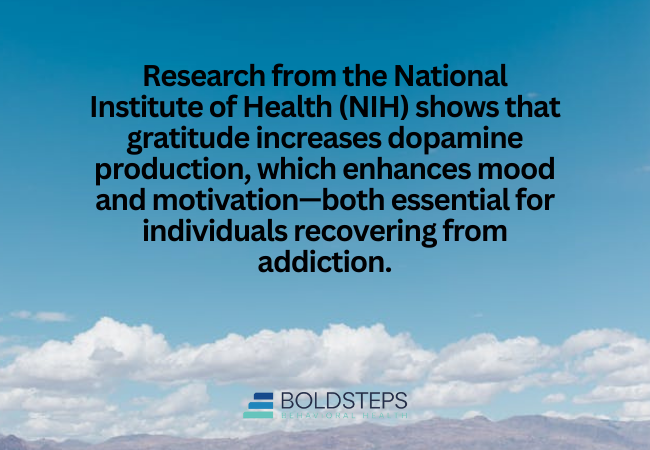Recovery is more than just abstaining from substances—it’s about transforming your mindset, finding joy in small victories, and building a life that promotes healing and well-being. One of the most powerful yet simple tools that can enhance this transformation is a gratitude journal.
At Bold Steps Behavioral Health in New Hampshire, we integrate holistic approaches like gratitude journaling into our Addiction Treatment Programs, helping individuals build a strong foundation for sobriety. Whether you’re in Medical Detox, an Intensive Outpatient Program (IOP), or accessing treatment through Virtual Treatment Programs, gratitude can play a key role in your journey.
This guide explores 15 compelling reasons why keeping a gratitude journal can support addiction recovery and overall mental health.
Understanding the Role of Gratitude in Recovery
Gratitude is the practice of focusing on the positive aspects of life, even during difficult times. Research shows that gratitude can:
- Reduce cravings and relapse risk by shifting focus away from triggers.
- Improve emotional resilience, making it easier to handle stress.
- Enhance relationships, strengthening support systems crucial for recovery.
By maintaining a gratitude journal, individuals can reprogram their mindset, promoting positivity, self-awareness, and long-term recovery success.
15 Reasons to Keep a Gratitude Journal in Addiction Recovery
1. Reduces Stress and Anxiety
Journaling about gratitude has been shown to lower cortisol levels (stress hormones), helping individuals feel more relaxed and in control.
2. Strengthens Mental Health
Gratitude activates dopamine and serotonin, neurotransmitters that improve mood and emotional stability, especially beneficial for individuals in Dual Diagnosis Treatment Programs.
3. Supports Sobriety and Long-Term Recovery
Focusing on gratitude reinforces positive lifestyle changes and serves as a daily reminder of why sobriety is important.
4. Encourages Self-Reflection and Awareness
Writing about daily gratitudes helps identify patterns, recognize personal growth, and gain a deeper understanding of emotions.
5. Enhances Mindfulness and Presence
Journaling keeps individuals focused on the present moment, preventing rumination over past mistakes or future worries.
6. Boosts Motivation in Addiction Treatment
Tracking gratitude provides tangible proof of progress, helping individuals stay committed to their recovery journey.
7. Strengthens Relationships and Social Connections
Expressing gratitude toward others strengthens social bonds, improving relationships with family, friends, and therapists.
8. Increases Self-Compassion
Gratitude journaling reduces self-criticism and promotes a kinder inner dialogue, which is crucial for those healing from addiction-related guilt.
9. Encourages a Positive Outlook on Life
Negative thinking patterns often fuel addiction. Gratitude rewires the brain, shifting focus from problems to solutions.
10. Promotes Better Sleep
Studies show that journaling about gratitude before bedtime improves sleep quality, which is essential for emotional and physical healing.
11. Reduces the Risk of Relapse
When faced with cravings, reflecting on gratitude can serve as a reminder of why sobriety matters, reducing impulsive decision-making.
12. Helps with Dual Diagnosis Treatment
For individuals with co-occurring mental health conditions, gratitude journaling supports therapy and encourages emotional regulation.
13. Reinforces Therapy and Counseling Techniques
Many addiction therapies, including Cognitive Behavioral Therapy (CBT) and Dialectical Behavior Therapy (DBT), incorporate gratitude to restructure negative thought patterns.
14. Encourages Goal Setting and Achievement
Tracking progress through journaling motivates individuals to set and achieve recovery goals.
15. Provides a Tangible Record of Progress
Looking back at past journal entries offers proof of transformation, reinforcing confidence in the recovery journey.
How to Start a Gratitude Journal in Recovery
1. Choose a Format
- Handwritten journal (notebook, planner).
- Digital journal (apps, Google Docs, or notes on your phone).
2. Set a Writing Routine
- Morning practice: Write down three things you’re grateful for to start the day positively.
- Evening reflection: Reflect on what went well that day and how you overcame challenges.
3. Be Specific and Personal
Instead of writing, “I’m grateful for my friends,” try:
“I’m grateful for my best friend who checked in on me today because it made me feel supported.”
4. Use Gratitude Prompts
- What’s one challenge I overcame today?
- Who supported me this week?
- What made me smile recently?
5. Incorporate Gratitude into Therapy
Sharing journal entries during therapy sessions can enhance emotional processing and deepen self-awareness.
Gratitude as a Tool for Relapse Prevention
How Gratitude Helps Prevent Relapse
Recovery is filled with ups and downs, and moments of doubt can arise. When cravings strike, gratitude journaling serves as a powerful relapse prevention tool by:
- Shifting focus away from cravings and onto personal progress.
- Reinforcing positive coping strategies learned in Addiction Treatment Programs.
- Helping manage triggers by recognizing what’s working in life instead of dwelling on challenges.
By integrating gratitude into daily routines, individuals can strengthen their commitment to long-term sobriety.
The Role of Gratitude in Addiction Treatment Programs
At Bold Steps Behavioral Health, we integrate gratitude practices into all levels of care, from Medical Detox Programs to Outpatient Treatment Programs.
How Gratitude Journaling Enhances Recovery Programs:
- Medical Detox Program: Encourages focus on progress rather than withdrawal discomfort.
- Partial Hospitalization Program (PHP): Helps manage stress and emotional processing.
- Intensive Outpatient Program (IOP): Reinforces therapy and self-awareness.
- Outpatient Treatment Program: Supports long-term relapse prevention.
- Virtual Treatment Program: Allows remote access to mindfulness-based recovery practices.
Through Behavioral Health Treatment in New Hampshire, we guide individuals toward holistic healing approaches for lasting recovery.
Why Choose Bold Steps Behavioral Health?
At Bold Steps Behavioral Health, we believe that recovery is about more than just quitting substances—it’s about building a fulfilling, meaningful life.
What We Offer:
- Personalized treatment plans tailored to individual needs.
- Evidence-based therapies, including CBT, DBT, and trauma-informed care.
- Holistic recovery approaches, such as gratitude journaling, mindfulness, and stress management.
- Flexible treatment options, including Virtual Treatment Programs for accessibility.
Our goal is to help individuals develop healthy coping strategies and achieve long-term recovery success.
Take the First Step Toward a Gratitude-Filled Recovery
Gratitude is more than just a feeling—it’s a transformational practice that can reinforce sobriety, improve mental health, and enhance overall well-being.
If you or a loved one is struggling with addiction, Bold Steps Behavioral Health is here to provide comprehensive, evidence-based treatment tailored to your needs.
Call us today at (603) 915-4223 or visit Bold Steps Behavioral Health to learn more about our programs, including our Addiction Treatment Program, Dual Diagnosis Treatment Program, and Outpatient Treatment Program. Let us help you take the bold steps toward a healthier, more grateful life.
FAQ About Power of Gratitude in Addiction Recovery
How can gratitude journaling help with addiction recovery?
Gratitude journaling helps individuals in recovery by shifting focus from cravings and negative emotions to positive experiences and personal growth. It reinforces a positive mindset, reduces stress, and strengthens emotional resilience, all of which are crucial for maintaining sobriety.
How often should I write in my gratitude journal?
Consistency is key. Many people find that writing in a gratitude journal once a day or a few times a week is beneficial. The goal is to create a routine that encourages positive thinking and self-reflection.
What are some prompts to use in a gratitude journal?
If you’re unsure what to write, try these prompts:
- What are three things I’m grateful for today?
- Who in my life has supported my recovery, and why am I thankful for them?
- What is something I accomplished this week that made me feel proud?
- How has my recovery journey positively changed my life?
Can gratitude journaling help prevent relapse?
Yes. Keeping a gratitude journal reinforces the reasons for staying sober, provides a positive outlet for managing stress, and helps individuals recognize their progress and personal growth, all of which lower the risk of relapse.
How does gratitude impact mental health in recovery?
Gratitude increases dopamine and serotonin levels, which are neurotransmitters that regulate mood, reduce anxiety, and improve overall emotional well-being. It also helps with self-esteem and stress management, key factors in long-term recovery.
What if I struggle to find things to be grateful for?
Start small. Gratitude doesn’t have to be about big achievements. It can be as simple as a warm cup of coffee, a good conversation, or a peaceful moment during the day. Over time, recognizing these small positives will become easier.



